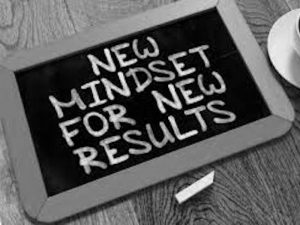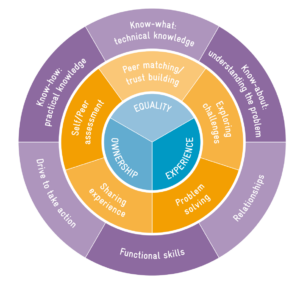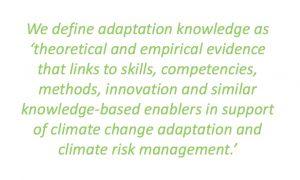Shaping Mindsets for Effective and Widespread Adaptation – From Building Capacity to Strengthening Capability
 Have you been involved in capacity development (CD) activities that failed to have a sustainable and lasting impact on the learner’s ability to do a better job or take more impactful action than before the CD activity? Or in trainings where the ‘knowing’ expert teaches the ‘unknowing’ participants? Fortunately, less and less of these one-directional CD approaches are being used while principles of co-creation and co-development become increasingly integrated in CD approaches across the globe. Yet many positive CD examples still struggle to retain widespread impact. (see also the Special Report on the Global Climate Change Alliance +, 2023, Hagelsteen 2024). Consequently, a lot remains to be done to improve CD practices.
Have you been involved in capacity development (CD) activities that failed to have a sustainable and lasting impact on the learner’s ability to do a better job or take more impactful action than before the CD activity? Or in trainings where the ‘knowing’ expert teaches the ‘unknowing’ participants? Fortunately, less and less of these one-directional CD approaches are being used while principles of co-creation and co-development become increasingly integrated in CD approaches across the globe. Yet many positive CD examples still struggle to retain widespread impact. (see also the Special Report on the Global Climate Change Alliance +, 2023, Hagelsteen 2024). Consequently, a lot remains to be done to improve CD practices.
We promote a decentralized approach to ‘Capacity Development for Effective Adaptation’ that follows a set of underlying principles:
- CD should take a long-term approach;
- CD activities should be embedded in the learners’ daily professional activities and should be governed by the learning conditions and aspirations of the learner. The learner should be in the driving seat, with trainers, coaches, mentors etc. adjusting to the speed, required content, pre-knowledge of the learner (demand-drivenness);
- CD should be trust-based, contextualised and culturally sensitive;
- CD should focus on a smart mixture of offline/ face-to-face (coaching, training, collective sense-making) and online/ e-learning);
- CD should use the latest findings in view of pedagogy (including adult learning principles), didactics and collective sense-making, e.g. theory U, social labs, serious games, scenario planning, future visioning;
- Adaptation science contributes to the knowledge pool for effective adaptation. However, it remains important to capture and integrate the more hands-on and tacit knowledge of practitioners. More work is needed to develop knowledge products and CD materials that incorporate knowledge from both sources.

PlanAdapt’s CD approach focuses on a network approach that facilitates two-way learning exchanges between (a) experienced advisors, researchers and experts and (b) professionals in climate-sensitive sectors in the Global South that grapple with real-world adaptation challenges (Golhasany & Harvey 2023). We struggle with the term ‘capacity building’ and advocate for ‘capability strengthening‘ that better recognises and brings to the fore the substantial knowledge, expertise, experience and ability that exists in individuals, communities and institutions within the Global South.
PlanAdapt aims to develop various forms of match-making tools to support this customised and innovative learning by professionals who are not usually exposed to climate risk management and adaptation knowledge. The approach attempts to go beyond the institutional or professional role of an individual, by addressing the individual’s values, aptitudes, convictions and personal agency. In addition, we try to integrate the understanding of the interlinkages between capability, decision-making and behavioral change into our CD approaches (e.g. COM-B).
 The people in the Global South facing dramatic adaptation challenges and cannot wait for university curricula to integrate adaptation knowledge and tertiary education institutions to produce the hundreds and thousands of skilled graduates and professionals that will be needed to enable widespread and effective adaptation. Therefore, it will need other complementary ways of learning and professional development, such as peer learning, social innovation labs etc.
The people in the Global South facing dramatic adaptation challenges and cannot wait for university curricula to integrate adaptation knowledge and tertiary education institutions to produce the hundreds and thousands of skilled graduates and professionals that will be needed to enable widespread and effective adaptation. Therefore, it will need other complementary ways of learning and professional development, such as peer learning, social innovation labs etc.
Co-Learning Systems and Communities of Practice

The pentagons represent the cooperation systems taking part in the broader co-learning system (source: OneOffTech, GIZ 2020)
In PlanAdapt, we constantly experiment with new ways of collective learning. An approach that our organisational model and the Climate Co-Adaptation Lab borrow ideas from, is a special type of community of practice approach: co-learning systems (GIZ 2020). Cooperative learning systems (in short co-learning systems) can be seen as a special type of CoP, whose members are participants of different cooperation systems and whose structures are set up with the primary goal of enhancing knowledge production and transmission in a specific field.
We plan to significantly expand our work in this area of action, based on initial experiences in collaboration with the Association of Commonwealth Universities, Humboldt Berlin University, GIZ and Adelphi, United Nations University and Eurac Research, Leuphana University/ Arizona State University. Our flagship initiative is the CLARE Capacity Strengthening Hub.
Please find more info in our joint publication with GIZ, BMU and the International Climate Initiative, Unleashing the Potential of Capacity Development for Climate Action – Fixing a Broken Link on the Pathway to Transformational Change.
